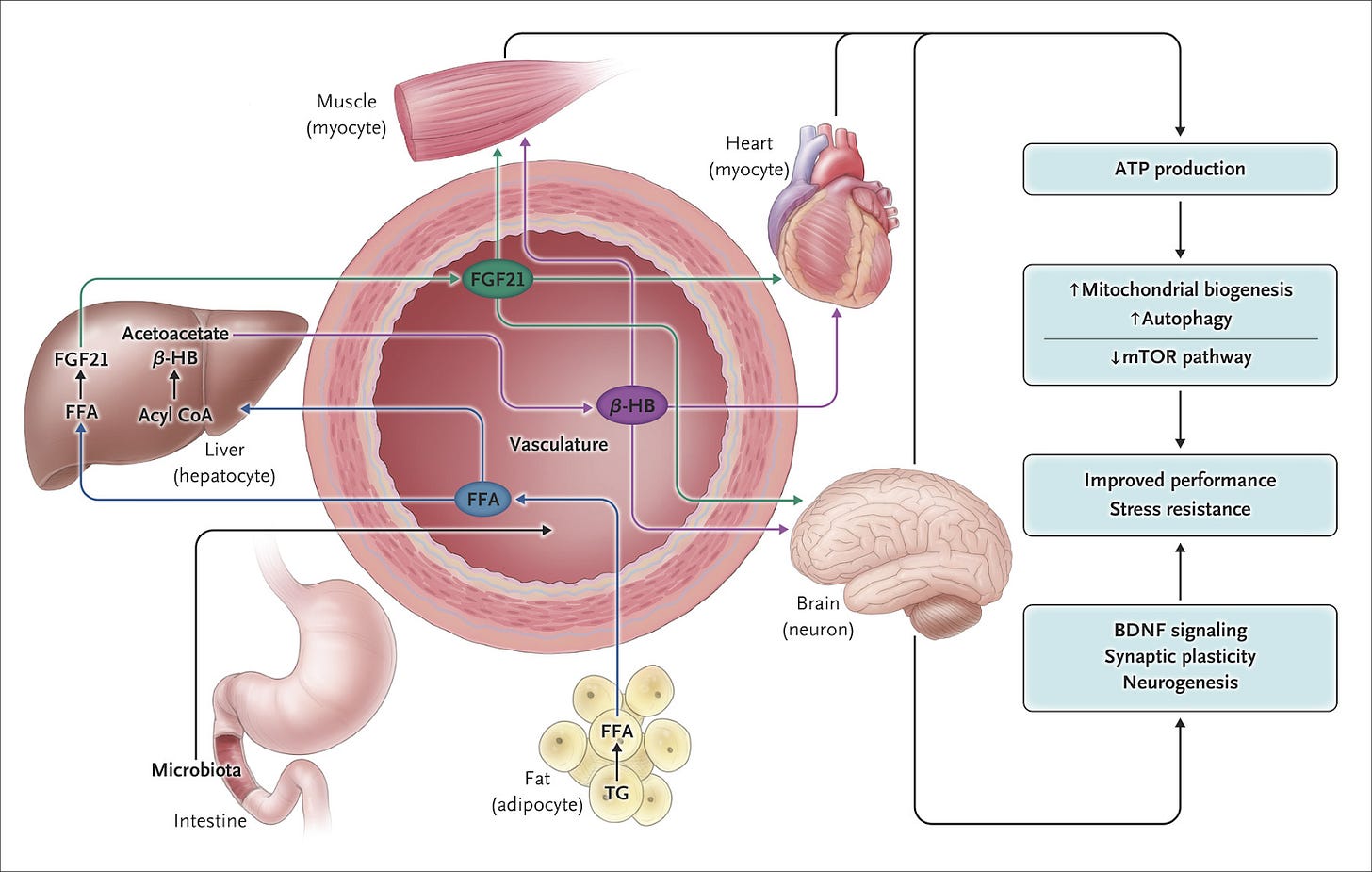Time-restricted Eating for Metabolic Health: Just 'Calorie Counting' in Disguise?
Are there unique benefits to shortening your eating window?
Greetings!
In this post, we’ll take a deep dive into the science of fasting and discuss whether time-restricted eating is “better” than calorie counting for health and weight loss.
In the ever-evolving landscape of health and wellness — including both evidence-based and pseudoscientifically unsound practices — fasting has been a topic of major interest, not only for people looking to lose weight, but also those seeking well-being, better brain health, or an increased lifespan.
Some say fasting is a passing fad, but its origin as an ancient practice suggests otherwise. Modern nutrition science is catching up with what some cultures have known for centuries.
Life in the fast lane
The allure of fasting is in part due to its accessibility — it requires no special gadgets or diet plans and it’s cost-free.
Furthermore, fasting has several well-regarded benefits, and though many of them have only been studied in animal models to date, evolutionarily conserved processes that we share with our non-human relatives suggest that these benefits may also apply to us…or so the longevity maximizers hope.
Enhanced Brain Health 🧠
Intermittent fasting induces the production of brain-derived neurotrophic factor (BDNF), a protein that supports the survival and growth of neurons. It also promotes the release of ketone bodies, which serve as an alternative energy source for the brain during fasting periods.
Specifically, fasting triggers a “metabolic switch” in the brain, enhancing synaptic plasticity and neuronal resilience. This can contribute to a reduced risk of neurodegenerative diseases and age-related cognitive decline. It may also be why some people claim to have improved mental clarity during periods of fasting, though some of these claims are anecdotal.
Improved Metabolic Health ⚖️
Intermittent fasting improves insulin sensitivity by modulating the expression of insulin receptors and enhancing cellular response to insulin. It also promotes the utilization of stored glucose and fatty acids during fasting periods, during which a decrease in blood glucose levels and insulin secretion occurs, preventing insulin resistance.
This “metabolic flexibility” contributes to better overall glucose homeostasis and reduced inflammation.
Increased Longevity ⌛
Intermittent fasting induces a mild stress response at the cellular level, activating signaling pathways such as AMP-activated protein kinase (AMPK) and sirtuins. These pathways play crucial roles in cellular repair, DNA stability, and longevity promotion (in animals).
Cellular stress responses during fasting stimulate autophagy (described below), the process by which cells remove damaged components. This contributes to cellular renewal and may counteract the effects of aging.
Autophagy ♻️
Fasting triggers autophagy by inhibiting the mechanistic target of rapamycin (mTOR) pathway. Autophagy allows cells to break down and recycle damaged or dysfunctional components, promoting cellular health.
The temporary nutrient deprivation during fasting activates autophagy as a cellular survival mechanism. This process is essential for maintaining cellular homeostasis and preventing the accumulation of damaged cellular structures, also known as senescent cells.
Cardiovascular Health 🫀
Intermittent fasting can lead to improvements in lipid profiles, including reduced levels of total cholesterol, low-density lipoprotein (LDL) cholesterol, and triglycerides. It also supports blood vessel health and may reduce blood pressure. It does this in part by promoting the utilization of stored fat, leading to a decrease in circulating lipid levels.
Additionally, fasting may enhance endothelial function and reduce oxidative stress, contributing to cardiovascular health.
Weight Management 📏
The restricted eating window in intermittent fasting naturally reduces calorie intake. It also promotes fat oxidation and the utilization of stored energy, contributing to weight loss and improved body composition (i.e., less body fat and maintained lean muscle mass, though the latter is somewhat controversial, as fasting may reduce lean body mass).
Fasting induces a shift in metabolic processes favoring fat utilization. Hormonal changes, including increased norepinephrine and human growth hormone levels, contribute to the mobilization of stored fat for energy during fasting.
While these mechanisms are supported by scientific studies, it's important to note that individual responses to intermittent fasting can vary. Furthermore, ongoing research continues to deepen our understanding of the molecular and physiological changes associated with intermittent fasting, and some of this research suggests that it may be reduced calorie intake per se — not any “magical” benefits of fasting — that are causing these wide-ranging benefits.
Fasting “on the clock”
A variation of the popular intermittent fasting approach, time-restricted eating (TRE), is a dietary method that involves restricting one’s daily eating window, typically to a period of 4–8 hours, with the remainder of the day spent fasting or consuming calorie-free beverages like water, coffee, tea, and diet soda. The more popular iterations of TRE include 16:8 TRE, 18:6 TRE, and 20:4 TRE — humans like even numbers, it seems. Hey, if you want to do a 17:7 TRE protocol, who am I to stand in your way?
A number of studies have compared the effects of TRE to traditional dietary restriction, also known as calorie restriction (CR), and the results may surprise you.
Keep reading with a 7-day free trial
Subscribe to Physiologically Speaking to keep reading this post and get 7 days of free access to the full post archives.






